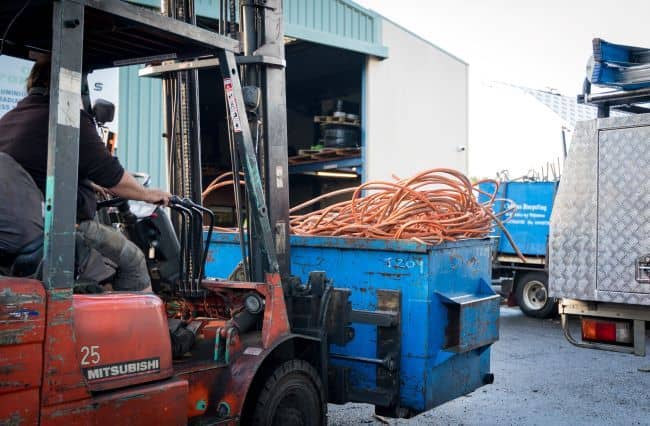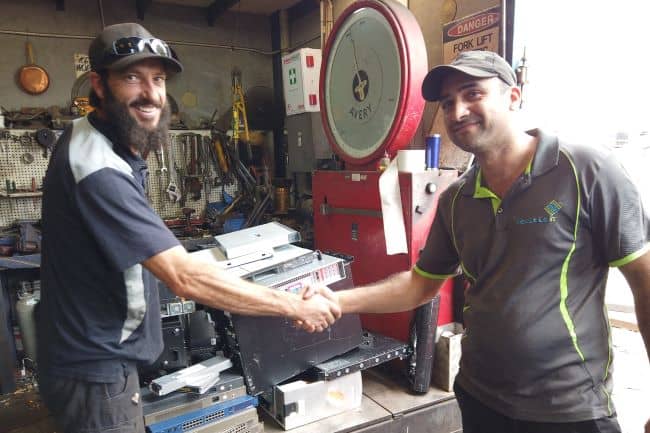Scrap metal is often viewed for its monetary value, the impact recycling it has on the environment, or both. Unfortunately, people forget the inherent risks of dealing with various metals at a scrap metal yard.
At Collins Recycling, we are committed to the well-being of our team and those who bring materials to us for recycling. We do all we can to ensure the safety of everyone at our facility and follow strict guidelines to make this possible.
Safety Guidelines for Your Protection
We abide by all safety protocols for a light industrial site, such as proper headgear, eye protection, steel-toed boots, gloves etc. Collins Recycling also has several non-negotiable rules to ensure your safety.
- Be aware of the risks that come from machinery without guards in place. It is not unusual for machines brought to a recycling facility to already have safety guards removed, especially if the guards were of non-recyclable material. Care must be taken around these items as many contain various moving parts capable of causing severe injuries.
- Keep your skin covered to avoid exposure to potential chemical burns. Also, ensure you attend to any exposure immediately to prevent significant injury or long-term consequences.
Examples of dangerous substances found at scrap recycling facilities include,
-
- Mercury
- Arsenic
- Lead
- Beryllium
- Radioactive Scrap
Safe Loading and Unloading of Materials
Injuries during loading and unloading materials at a scrap recycling facility are common, but many are preventable. The back, shoulders, neck, and knees are the most common areas where injuries occur from loading or unloading metal. Practising ergonomics (the study of efficiency and safety in the workplace) is one way to help prevent injuries caused by moving loads of metal. Additionally, you can prevent many injuries by not lifting any materials that are more than half your weight and asking for help with large loads of scrap metal.
Stay Clean
Wearing protective clothing is the first line of protection against several hazards at a scrap recycling centre. However, various materials brought to Collins Recycling may contain residue of chemical or corrosive substances. To prevent injury, make sure you are clean after handling scrap metal. Thoroughly wash any areas of skin exposed while handling scrap metal, especially your hands and arms.
Check Metals for Rust
Clean metals with no signs of rust are safer, by far than rusty and corroded metals. Use caution when cleaning rust away or working with metals covered in rust. If you puncture your skin with rusty metal, you run the risk of developing a bacterial infection known as tetanus. The best way to guard against the infection is to maintain a current tetanus vaccination.
Things to Know Before Bringing Scrap Metal to Collins Recycling
- Collins Recycling strictly adheres to all regulations governing the handling of scrap metal. We must see the required paperwork and identification before we will accept scrap metal.
- To sell copper or brass, you must have a 100-point ID. Additionally, a utility bill or phone bill must accompany a passport or driver’s license.
- Collins Recycling reserves the right to refuse transactions that do not comply with regulations.
- No booking is necessary.
- Sort your metals before entering.
- Not every metal has monetary value. Please get in touch with us if you are in doubt.
What Collins Recycling Will Not Do
- We do not pick up cars
- There is no demolition work done at our recycling facility
- We do not sell scrap metal to the public
- We will not accept LPG gas bottles
- We will not take oils, asbestos, liquids, plastics, or car tyers.
- We will not take scrap metal without the required identification and paperwork
Recycling scrap metal is good for the environment and your wallet. Just be sure to follow the safety regulations and guidelines for preparing the metal. If you need more information or have questions, feel free to contact the recycling pros at Collins Recycling. The friendly experts are happy to help make your recycling experience as easy as possible.









